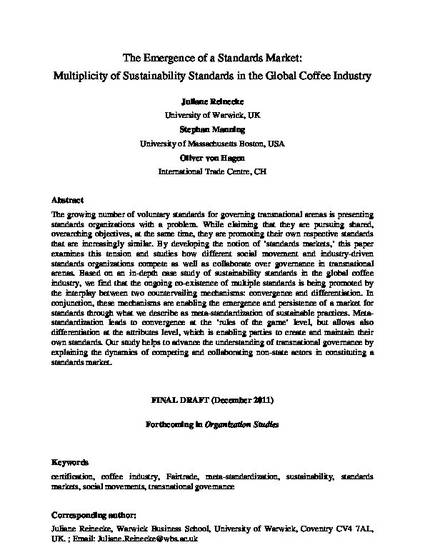
- Agribusiness,
- Business Administration, Management, and Operations,
- Business Law, Public Responsibility, and Ethics,
- Demography, Population, and Ecology,
- Economic Policy,
- Environmental Policy,
- Inequality and Stratification,
- International Business,
- International Relations,
- Labor Relations,
- Place and Environment,
- Politics and Social Change,
- Strategic Management Policy and
- Work, Economy and Organizations
The growing number of voluntary standards for governing transnational arenas is presenting standards organizations with a problem. While claiming that they are pursuing shared, overarching objectives, at the same time, they are promoting their own respective standards that are increasingly similar. By developing the notion of ‘standards markets,’ this paper examines this tension and studies how different social movement and industry-driven standards organizations compete as well as collaborate over governance in transnational arenas. Based on an in-depth case study of sustainability standards in the global coffee industry, we find that the ongoing co-existence of multiple standards is being promoted by the interplay between two countervailing mechanisms: convergence and differentiation. In conjunction, these mechanisms are enabling the emergence and persistence of a market for standards through what we describe as meta-standardization of sustainable practices. Meta-standardization leads to convergence at the ‘rules of the game’ level, but allows also differentiation at the attributes level, which is enabling parties to create and maintain their own standards. Our study helps to advance the understanding of transnational governance by explaining the dynamics of competing and collaborating non-state actors in constituting a standards market.

See also: http://ssrn.com/abstract=1970343